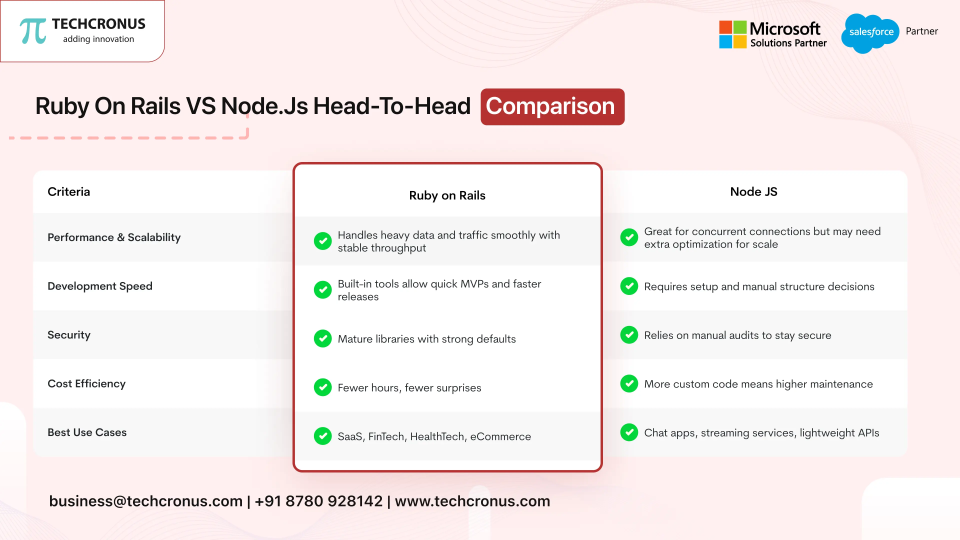Table of Contents
Technology can make or break even the strongest business. One wrong framework choice can waste money, delay product/services launches and slow down the profit stream for years. Many founders now ask, Ruby on Rails vs Node.js – which is better as we move toward 2026?
Speed and scalability matter, but reliability decides survival. The global market is filled with half-built apps, rising costs and missed opportunities. Techcronus has seen how choosing the wrong stack has forced companies to rebuild everything from scratch.
This article breaks down every angle of Ruby on Rails vs Node.js performance so you can choose with clarity, not regret.
Market Context – The 2026 Tech Landscape
The next wave of competition is brutal. AI, automation and real-time platforms will stretch every backend system to its limits. Businesses that can’t deliver smooth experiences will lose customers very quickly.
The next few years will separate strong digital products from weak ones, because:
- Global users expect instant responses, no bugs and no downtime.
- A single crash can destroy a reputation overnight.
- Businesses choosing the wrong backend today will pay a high price tomorrow.
- That’s why every boardroom is debating Ruby on Rails vs Node.js before 2026 hits.
The Node.js vs Ruby on Rails comparison 2026 has turned serious because speed alone no longer wins. Maintenance, data security and team stability matter more. The wrong stack drains time, multiplies costs and locks you into endless fixes.
When founders study Ruby on Rails vs Node.js for web development, they realise it’s not about coding preference. It’s about how long their platform can survive heavy traffic without breaking.
For those chasing global markets, stability isn’t optional. That’s why decision-makers keep asking Ruby on Rails vs Node.js which is better — because one mistake now could mean lost customers, slower performance or failed funding rounds later.
Every fast-growing company needs to choose wisely. There’s no safety net for poor tech choices in 2026.
Overview of Ruby on Rails VS Node.js in 2025–26
Ruby on Rails (RoR) is a complete website-building tool. It follows clear rules and gives a strong, stable base — so your app runs smoothly and safely. It delivers fast MVPs, cleaner code and predictable scaling. Companies that value secure and consistent delivery often rely on it.
Node.js is flexible and powered by JavaScript. It supports lightweight apps, live chats and real-time features. But flexibility brings risk because poor architecture can slow growth and increase costs.
In the Ruby on Rails vs Node.js popularity 2026 debate, your business model decides the winner.
- RoR dominates structured enterprise builds
- Node thrives in smaller, event-driven tools.

When comparing Ruby on Rails vs Node.js for backend development, the pattern is clear.
- Rails offers safety and order; Node offers freedom that can turn chaotic if unmanaged.
- Startups often fall for speed hype, choosing Node to “move fast,” but end up rebuilding once scale exposes weak architecture. Node.js vs Ruby on Rails for startups isn’t a style debate — it’s a financial decision.
- With RoR, you trade a bit of early flexibility for long-term peace of mind. With Node, you gamble your scalability.
- The hidden cost of poor architecture shows when traffic doubles and your app breaks. That’s the silent fear behind every CTO’s late-night call.
A wrong decision in Ruby on Rails vs Node.js which is better discussions can lead to technical debt that drains your future funding.
Expert Forecast: 2026 and Beyond
Technology is shifting fast. Rails 8 introduces Hotwire and Turbo to reduce load times drastically. Node.js 22 improves module efficiency and security. Both are evolving — but stability wins the long race.
Based on current trends, Node.js vs Ruby on Rails comparison 2025 data shows enterprises leaning toward frameworks that minimize maintenance risk. Rails’ convention-driven design means fewer moving parts, fewer surprises.
By 2026, AI-based apps and integrated analytics will demand dependable frameworks. Rails fits that future better because it protects developers from common errors. Node will remain relevant for real-time apps, but when compliance and scale meet, Rails proves safer.
In short, the Ruby on Rails vs Node.js performance debate will continue — but those chasing reliability, not fashion, will pick Rails.
A Mini Case Study
A logistics client in the UAE came to TechCronus after its Node.js platform slowed during expansion. Real-time tracking delayed updates and users complained. Our audit compared Ruby on Rails vs Node.js performance under load testing.
Rails offered faster database handling and simpler scaling. After migration, uptime rose to 99.9%, page load time dropped by 40%. This helped the client expand operations into new regions.
This project proved what data often hides, flexibility without structure costs growth. Choosing right early saves a fortune later.
Real Questions Clients Forget to Ask, But Should
- Is Ruby on Rails still reliable in 2026?
Yes because it is mature, secure and battle-tested. Many companies comparing Ruby on Rails vs Node.js think Rails is old, but it’s evolving fast with Rails 8. - Can Node.js handle enterprise scale?
It can, but only with careful design. In many audits, our Node.js vs Ruby on Rails comparison 2026 showed Rails scaling better for complex systems that need structure. - Which performs faster under pressure?
It depends on the workload. Ruby on Rails vs Node.js performance tests show Rails wins in data-heavy apps; Node suits smaller real-time tools only. - What about team turnover and code quality?
Teams change; frameworks stay. A solid Ruby on Rails vs Node.js for web development plan avoids chaos when new developers join. - Which is safer for long-term growth?
If risk worries you, ask again, Ruby on Rails vs Node.js which is better for the next five years? The safer answer is usually Rails. One wrong pick can drain your future budget fast.
Business Takeaway & Recommendation
Deciding on Ruby on Rails or Node.js for enterprise apps is not about what’s trendy. It’s about risk. Wrong frameworks bleed money through downtime, re-engineering and lost clients.
Rails suits teams that value:
- Predictability
- strong data management
- and fast delivery.
Node suits smaller, real-time experiments. Most businesses ready for serious scale find Rails safer.
The next time you consider Ruby on Rails vs Node.js which is better, remember: speed can be rebuilt; trust cannot. TechCronus helps global companies choose right before it’s too late.
Connect with us Today!
Scaling a startup in London or modernizing an enterprise in Dubai? Come to us, Techcronus helps you build secure, fast and future-ready applications with Ruby on Rails. Talk to us before your competitors do — the future won’t wait. Our experts will make sure your next tech choice strengthens your business instead of slowing it down.






















